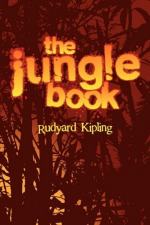There was one blast of furious trumpeting from the lines, and then the silence shut down on everything, and Kala Nag began to move. Sometimes a tuft of high grass washed along his sides as a wave washes along the sides of a ship, and sometimes a cluster of wild-pepper vines would scrape along his back, or a bamboo would creak where his shoulder touched it. But between those times he moved absolutely without any sound, drifting through the thick Garo forest as though it had been smoke. He was going uphill, but though Little Toomai watched the stars in the rifts of the trees, he could not tell in what direction.
Then Kala Nag reached the crest of the ascent and stopped for a minute, and Little Toomai could see the tops of the trees lying all speckled and furry under the moonlight for miles and miles, and the blue-white mist over the river in the hollow. Toomai leaned forward and looked, and he felt that the forest was awake below him—awake and alive and crowded. A big brown fruit-eating bat brushed past his ear; a porcupine’s quills rattled in the thicket; and in the darkness between the tree stems he heard a hog-bear digging hard in the moist warm earth, and snuffing as it digged.
Then the branches closed over his head again, and Kala Nag began to go down into the valley—not quietly this time, but as a runaway gun goes down a steep bank—in one rush. The huge limbs moved as steadily as pistons, eight feet to each stride, and the wrinkled skin of the elbow points rustled. The undergrowth on either side of him ripped with a noise like torn canvas, and the saplings that he heaved away right and left with his shoulders sprang back again and banged him on the flank, and great trails of creepers, all matted together, hung from his tusks as he threw his head from side to side and plowed out his pathway. Then Little Toomai laid himself down close to the great neck lest a swinging bough should sweep him to the ground, and he wished that he were back in the lines again.
The grass began to get squashy, and Kala Nag’s feet sucked and squelched as he put them down, and the night mist at the bottom of the valley chilled Little Toomai. There was a splash and a trample, and the rush of running water, and Kala Nag strode through the bed of a river, feeling his way at each step. Above the noise of the water, as it swirled round the elephant’s legs, Little Toomai could hear more splashing and some trumpeting both upstream and down—great grunts and angry snortings, and all the mist about him seemed to be full of rolling, wavy shadows.
“Ai!” he said, half aloud, his teeth chattering. “The elephant-folk are out tonight. It is the dance, then!”
Kala Nag swashed out of the water, blew his trunk clear, and began another climb. But this time he was not alone, and he had not to make his path. That was made already, six feet wide, in front of him, where the bent jungle-grass was trying to recover itself and stand up. Many elephants must have gone that way only a few minutes before. Little Toomai looked back, and behind him a great wild tusker with his little pig’s eyes glowing like hot coals was just lifting himself out of the misty river. Then the trees closed up again, and they went on and up, with trumpetings and crashings, and the sound of breaking branches on every side of them.




